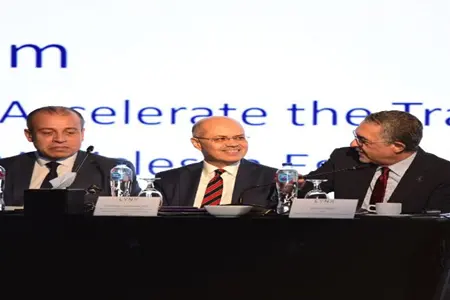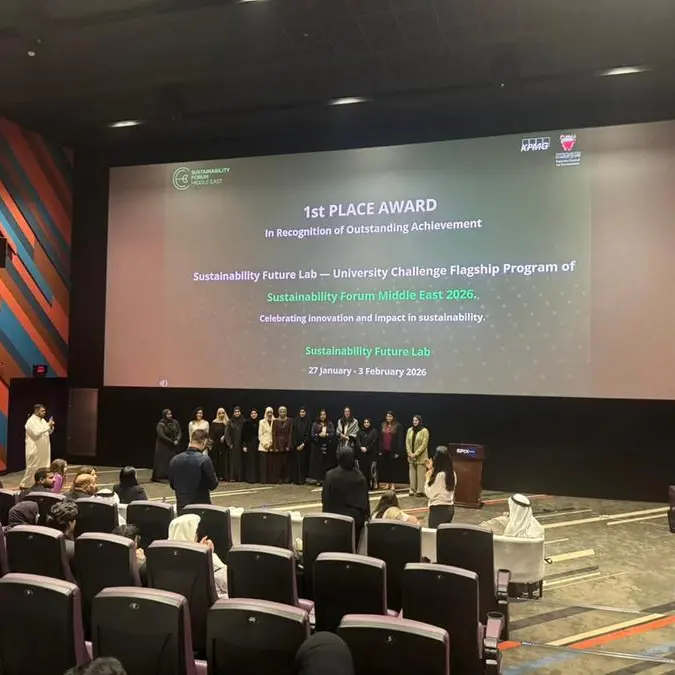PHOTO
- Hossam Heiba: AIDP places special emphasis on supporting the local manufacturing of EVs, including by reducing the minimum requirement for local value added to receive the Program’s incentives to only 30%.
Cairo, Egypt: The LYNX Forum on developing a Roadmap to Accelerate the Transition to New Energy Vehicles (NEVs) in Egypt was held in Cairo with the participation of senior government officials, private sector companies operating in the automotive, energy, e-mobility and banking sectors, and development partners to Egypt. The event, co-organized by LYNX Strategic Business Advisors, the United States Agency for International Development’s Business Egypt project (BE), implemented by DAI, USAID’s Trade Reform and Development in Egypt (TRADE) Project, and UBER, witnessed the launch of the collaboration between the four firms to enhance the roll-out of new energy vehicles (NEVs) in Egypt and attract new investments to the sector.
The Forum witnessed in depth discussions on the current Egyptian policies and global best practices associated with incentivizing demand for NEVs, availing infrastructure needs, and deepening the local manufacturing of the NEV industry, with the objective of developing a roadmap for Egypt to accelerate NEV roll out. Participants from the General Authority for Investment and Free Zones, the Ministries of Trade/Industry, Finance, Planning, Military Production, Public Business Sector and Transport, as well as the Electric Utility and Consumer Protection Regulatory Agency, engaged in interactive discussions, with a diverse array of industry players such as Uber, Volkswagen Group, Foxconn, Bollinger Motors, Nissan Motor, Toyota Tsusho, Ashok Leyland, General Motors, Stellantis, Al Nasr Automotive, Al Mansour Group, Aboughaly Motors, Obayken Group, Siemens, Acculon Energy, Plug El Sewedy, Infinity, Taqa Arabia, Brightskies Technologies, Shift EV, Leoni, Yazaki, Dr. Greiche, Samcrete, HSBC Bank, Afreximbank.
International business associations and development partners also contributed to these discussions, including representatives from the French Ministry of Ecological Transition, the Norwegian Electric Vehicles Association, the African Association of Automotive Manufacturers, the Society of Indian Automotive Manufacturers, the South African Association of Automotive Component and Allied Manufacturers, USAID, the European Bank for Reconstruction and Development (EBRD), United Nations Human Settlement
Program (UH Habitat), the United Nations Industrial Development Organization (UNIDO), GIZ, the UN Economic and Social Commission for Western Asia (UN ESCWA,) in addition to international experts from the Albright Stonebridge Group, Cerutus Consulting and E&Y.
In his remarks, delivered by Minister Plenipotentiary Yehia Al-Wathiq Billah, the Head of the Egyptian Commercial Services, the Minister of Trade and Industry Ahmed Samir reaffirmed the commitment of the Egyptian government to enhance the localization of electric vehicles in Egypt following the adoption of the Automotive Industrial Development Program (AIDP.) He stated that the government was actively working to accelerate the local manufacturing of electric vehicles through a developing a roadmap that entails reducing import duties on EVs and their components, offering rebates and tax breaks for companies investing in EV manufacturing, and encouraging partnerships with universities and research institutes engaged in EV technology. Al-Wathiq Billah stressed that the implementation of this ‘roadmap’ may lead to the local production of 100,000 EVs in Egypt in the coming years, position Egypt as a regional automotive hub, and contribute to ongoing efforts to mitigate climate change.
Youssef Abouseif, the General Manager of Uber Egypt, said ‘now is the time to take solid steps that enhance sustainable practices. As part of our commitment to become the cleanest platform on the planet, we work hard to create opportunities for everyone to move and live in a way that is conscious of the environment. We understand that we can’t achieve this bigger-than-us ambition without the right kind of partnerships in place and we are committed to being part of the collective efforts to reduce the carbon footprint. Egypt with its automotive industry potential in the region is one of the key markets for us to support the country’s electric direction and we will continue to be in close dialogue with relevant stakeholders both in government and private sector to discuss the roadmap and technology know-how needed to make this transition happen."
Dr. Ahmed Fekry Abdelwahab, Member of the Supreme Automotive Industrial Council, presented the main pillars of the AIDP, including the government’s vision to localize the automotive industry in horizontal and vertical directions, as well as the institutional set up that’s been adopted by the President to oversee the implementation of the AIDP through the Supreme Automotive Industrial Council and a special Fund to Support the Manufacturing of Environmentally Friendly Vehicles in Egypt.
Dr. Mohamed Mousa Omran, Chairman of the Egyptian Electricity and Consumer Protection Regulatory Agency (EgyptERA), explained the current policy framework adopted by the EgyptERA to facilitate the licensing, construction, and operation of EV charging stations in Egypt.
Khaled Nofal, the First Deputy Minister of Finance for Administrative and Technical Reform, outlined the various initiatives pursued by the government to incentivize demand for environmentally friendly vehicles and replace aged cars with new locally assembled ones through green incentive schemes. He added that the Ministry of Finance is now engaging the private sector on additional incentive schemes to accelerate the shift towards electric two and three wheelers to accomplish additional steps in decarbonizing the transport sector and enhancing the roll out of NEVs Egypt.
The President of the General Authority for Investment and Free Zones, Hossam Heiba, highlighted the overall policies that are being pursued to attract new investments in NEV sector, including the implementation of the decisions of the recent Supreme Investment Council meeting. He stressed the importance that the government places on developing the automotive industry as a key pillar of the economy, stating that the government is putting investments in the right place and that the economy continues to be resilient to global challenges.
Heiba highlighted that the AIDP places special emphasis on supporting the local manufacturing of electric vehicles, including by reducing the minimum requirement for local value added to receive the Program’s incentives to 30%, compared to 45% for internal combustion engines vehicles, in order to encourage investors to enter the Egyptian market and benefit from the geographical, labor, tax, customs and other advantages that the country is offering.
The discussions focused on key policies that the Egyptian government may consider that serve as drivers towards increased NEV adoption. These include national climate policies, financial and non-financial incentives to reduce cost of NEVs compared to internal combustion vehicles, policies to increase variety of model available, shaping public perception, building capacities and competent workforces, as well as policies to expand access to convenient and affordable publicly accessible chargers and ensure proper end of life management for NEVs and their batteries.
Following the event, Mohamed Hanafi, LYNX’s Managing Director, stated “LYNX is pleased to partner with
UBER, USAID Business Egypt and USAID TRADE Project to support the Egyptian government's direction to accelerate green transformation efforts, create a sustainable transport system and efforts to enhance the localization of the NEV industry in Egypt following the adoption of the AIDP. We strongly believe in the potential of the Egyptian automotive industry and its ability to attract additional global automotive industry players to the market following the adoption of the AIDP. We also believe that Egypt is well positioned to become an automotive industrial and exporting hub following the recent policy updates. Our intention, now, is to digest these very rich discussions that took place at the LYNX Forum and chart a structured approach on how we, as partners, will move forward on developing a roadmap for the government on accelerating the NEV transition through enhanced private sector participation.” “The USAID TRADE Project is proud to partner with Lynx and USAID’s Business Egypt on this important forum,” said Rachid Benjelloun, USAID TRADE’s Chief of Party. He continued that, “[A]s a project that supports both trade and investment enabling policies and provides technical assistance to small and medium enterprises (SMEs) in the engineering, including automotive, sector, USAID TRADE sees this forum as critical to positioning Egypt as an export hub in the automotive sector, particularly in New Energy Vehicles.”
Yomna Mustafa, Chief of Party USAID’s Business Egypt Program noted that “Bringing together government stakeholders, private sector industry players, development partners, and international experts to take stock of the current Egyptian policies, as well as global best practices, is key step towards incentivizing demand for NEVs and e- mobility in Egypt. Several factors need to be assessed including infrastructure needs for NEVs, as well as considering means of deepening the localization of the NEV industry in Egypt. USAID’s Business Egypt Program, together with Lynx, Uber and the USAID Trade Project, will continue to hold a series of discussions aimed to support the Egyptian government in developing a roadmap detailing specific steps to accelerate the transition to NEVs and create an enabling environment for new investments in Egypt in this important sector.
-Ends-




















